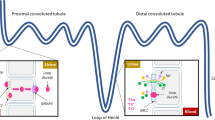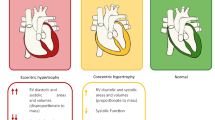Abstract
Therapies that modulate the sympathetic nervous system and renin-angiotensin-aldosterone system reduce morbidity and mortality in patients with heart failure. However, they are grossly underused in clinical practice; when used, the doses prescribed are substantially smaller than the target doses used in the large-scale studies that established their utility. Whether these suboptimal doses are as effective in reducing morbidity and mortality is largely unknown. This review focuses on the relationship between the dose of β-blockers and their effect on clinical outcomes. Because direct dose comparisons of β-blockers are limited, we draw upon a broader spectrum of clinical trials across the cardiovascular continuum that involved neurohormonal modulators to address the question, ‘Is more better?’
Similar content being viewed by others
References and Recommended Reading
Effects of enalapril on mortality in severe congestive heart failure. Results of the Cooperative North Scandinavian Enalapril Survival Study (CONSENSUS). The CONSENSUS Trial Study Group. N Engl J Med 1987, 316:1429–1435.
Effect of enalapril on survival in patients with reduced left ventricular ejection fractions and congestive heart failure. The SOLVD Investigators. N Engl J Med 1991, 325:293–302.
Effect of enalapril on mortality and the development of heart failure in asymptomatic patients with reduced left ventricular ejection fractions. The SOLVD Investigators. N Engl J Med 1992, 327:685-691. [Published erratum appears in N Engl J Med 1992, 327:1768.]
Kober L, Torp-Pedersen C, Carlsen JE, et al.: A clinical trial of the angiotensin-converting-enzyme inhibitor trandolapril in patients with left ventricular dysfunction after myocardial infarction. Trandolapril Cardiac Evaluation (TRACE) Study Group. N Engl J Med 1995, 333:1670–1676.
Pitt B, Zannad F, Remme WJ, et al.: The effect of spironolactone on morbidity and mortality in patients with severe heart failure. Randomized Aldactone Evaluation Study Investigators. N Engl J Med 1999, 341:709–717.
Torp-Pedersen C, Kober L: Effect of ACE inhibitor trandolapril on life expectancy of patients with reduced left-ventricular function after acute myocardial infarction. TRACE Study Group. Trandolapril Cardiac Evaluation. Lancet 1999, 354:9–12.
Packer M, Fowler MB, Roecker EB, et al.: Effect of carvedilol on the morbidity of patients with severe chronic heart failure: results of the carvedilol prospective randomized cumulative survival (COPERNICUS) study. Circulation 2002, 106:2194–2199.
The Cardiac Insufficiency Bisoprolol Study II (CIBIS-II): a randomised trial. Lancet 1999, 353:9–13.
Effect of metoprolol CR/XL in chronic heart failure: Metoprolol CR/XL Randomised Intervention Trial in Congestive Heart Failure (MERIT-HF). Lancet 1999, 353:2001–2007.
Buhler FR, Laragh JH, Baer L, et al.: Propranolol inhibition of renin secretion. A specific approach to diagnosis and treatment of renin-dependent hypertensive diseases. N Engl J Med 1972, 287:1209–1214.
Roe CM, Motheral BR, Teitelbaum F, Rich MW: Angiotensinconverting enzyme inhibitor compliance and dosing among patients with heart failure. Am Heart J 1999, 138:818–825.
dep ME, Shah NB, Tateo IM, Massie BM: Differences between primary care physicians and cardiologists in management of congestive heart failure: relation to practice guidelines. J Am Coll Cardiol 1997, 30:518–526.
Philbin EF, Andreaou C, Rocco TA, et al.: Patterns of angiotensin-converting enzyme inhibitor use in congestive heart failure in two community hospitals. Am J Cardiol 1996, 77:832–838.
Mendelson G, Aronow WS: Underutilization of angiotensinconverting enzyme inhibitors in older patients with Q-wave anterior myocardial infarction in an academic hospital-based geriatrics practice. J Am Geriatr Soc 1998, 46:751–752.
Bristow MR, Gilbert EM, Abraham WT, et al.: Carvedilol produces dose-related improvements in left ventricular function and survival in subjects with chronic heart failure. MOCHA Investigators. Circulation 1996, 94:2807–2816.
Bristow MR, O’Connell JB, Gilbert EM, et al.: Dose-response of chronic beta-blocker treatment in heart failure from either idiopathic or dilated or ischemic cardiomyopathy. Circulation 1994, 89:1632–1642.
Simon T, Mary-Krause M, Funck-Brentano C, et al.: Bisoprolol dose-response relationship in patients with congestive heart failure: a subgroup analysis in the cardiac insufficiency bisoprolol study (CIBIS II). Eur Heart J 2003, 24:552–559. This retrospective analysis of the CIBIS II trial highlights the importance of dose on prognosis in patients with heart failure.
Packer M, Poole-Wilson PA, Armstrong PW, et al.: Comparative effects of low and high doses of the angiotensin-converting enzyme inhibitor, lisinopril, on morbidity and mortality in chronic heart failure. ATLAS Study Group. Circulation 1999, 100:2312–2318.
Baruch L, Anand I, Cohen IS, et al.: Augmented short- and long-term hemodynamic and hormonal effects of an angiotensin receptor blocker added to angiotensin converting enzyme inhibitor therapy in patients with heart failure. Vasodilator Heart Failure Trial (V-HeFT) Study Group. Circulation 1999, 99:2658–2664.
Parving HH, Lehnert H, Brochner-Mortensen J, et al.: The effect of irbesartan on the development of diabetic nephropathy in patients with type 2 diabetes. N Engl J Med 2001, 345:870–878. This prospective study suggests that higher doses of an ARB confer greater nephroprotection despite similar levels of blood pressure control.
Lonn E, Yusuf S, Dzavik V, et al.: Effects of ramipril and vitamin E on atherosclerosis: the study to evaluate carotid ultrasound changes in patients treated with ramipril and vitamin E (SECURE). Circulation 2001, 103:919–925.
Lindholm LH, Ibsen H, Dahlof B, et al.: Cardiovascular morbidity and mortality in patients with diabetes in the Losartan Intervention For Endpoint reduction in hypertension study (LIFE): a randomised trial against atenolol. Lancet 2002, 359:1004–1010.
Dickstein K, Kjekshus J: Effects of losartan and captopril on mortality and morbidity in high-risk patients after acute myocardial infarction: the OPTIMAAL randomised trial. Optimal Trial in Myocardial Infarction with Angiotensin II Antagonist Losartan. Lancet 2002, 360:752–760.
Pitt B, Poole-Wilson PA, Segal R, et al.: Effect of losartan compared with captopril on mortality in patients with symptomatic heart failure: randomised trial--the Losartan Heart Failure Survival Study ELITE II. Lancet 2000, 355:1582–1587.
Brenner BM, Cooper ME, de Zeeuw D, et al.: Effects of losartan on renal and cardiovascular outcomes in patients with type 2 diabetes and nephropathy. N Engl J Med 2001, 345:861–869.
Pfeffer MA, McMurray JJ, Velazquez EJ, et al.: Valsartan, captopril, or both in myocardial infarction complicated by heart failure, left ventricular dysfunction, or both. N Engl J Med 2003, 349:1893–1906.
Dickstein K: What did we learn from the OPTIMAAL trial? What can we expect from VALIANT? Am Heart J 2003, 145:754–757.
Poole-Wilson PA, Swedberg K, Cleland JG, et al.: Comparison of carvedilol and metoprolol on clinical outcomes in patients with chronic heart failure in the Carvedilol Or Metoprolol European Trial (COMET): randomised controlled trial. Lancet 2003, 362:7–13.
Kukin ML, Kalman J, Charney RH, et al.: Prospective, randomized comparison of effect of long-term treatment with metoprolol or carvedilol on symptoms, exercise, ejection fraction, and oxidative stress in heart failure. Circulation 1999, 99:2645–2651.
Kukin ML, Mannino MM, Freudenberger RS, et al.: Hemodynamic comparison of twice daily metoprolol tartrate with once daily metoprolol succinate in congestive heart failure. J Am Coll Cardiol 2000, 35:45–50.
Metra M, Giubbini R, Nodari S, et al.: Differential effects of beta-blockers in patients with heart failure: a prospective, randomized, double-blind comparison of the long-term effects of metoprolol versus carvedilol. Circulation 2000, 102:546–551.
Author information
Authors and Affiliations
Rights and permissions
About this article
Cite this article
Baruch, L., Kunamneni, P. Beta-blockers in heart failure: Is more better?. Curr Heart Fail Rep 1, 77–81 (2004). https://doi.org/10.1007/s11897-004-0030-7
Issue Date:
DOI: https://doi.org/10.1007/s11897-004-0030-7




